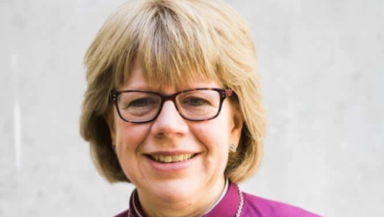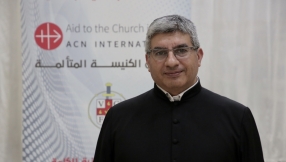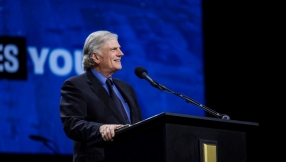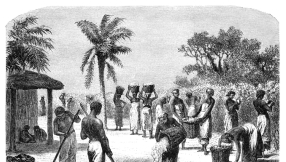
When the chips are down, what qualities do you look for in a leader? Someone who can offer a stirring speech or a strategic vision might spring to mind. But when a storm comes, there is something to be said for a calm voice and a firm hand on the tiller. And with this morning’s historic announcement that Sarah Mullally, the Bishop of London, is to be our 106th Archbishop of Canterbury, that is exactly what the Church of England has chosen.
Bishop Sarah is not an evangelical. She has previously led on the Living in Love and Faith process, and described the vote in 2023 to approve same-sex blessings as a "moment of hope for the Church" noting that there were prayers "within that suite that I would use". But she has always been aware of the differences of opinion across the Church of England on this, and other, issues, adding "I know that what we have proposed as a way forward does not go nearly far enough for many but too far for others."
In her diocese she is well known for attending services at parishes, where on grounds of theological conviction, they are unable to receive the ministry of women bishops or priests, despite her not being able to fully participate in services. She is gracious in seeking to bring unity, even at personal cost. She is committed to ensuring there is a space and a place in our church for everyone, showing this with actions as well as words, holding both people and process central.
There has been one high profile safeguarding crisis in London diocese, though Bishop Sarah was not directly responsible for the investigation, some have expressed their unhappiness about her role in this. It is possible that, with ongoing media speculation and digging likely, her role in this case may be clarified and explained more in the coming days and weeks. She said this morning that the church must confront the dynamics of power, as we have "often failed to recognise or take seriously the misuse of power in all its forms".
Bishop Sarah is known to be pastoral and practical in her leadership style, supporting not just clergy in her area, but others who have got in touch, including lay people. She has provided advice and support for other new bishops. Emails are replied to warmly and pastorally, whoever you are - perhaps a small thing, but every little helps! This is a leader who wants everyone to know that they have been heard, even if the outcome cannot please everyone.
My personal experience of her is that she is caring, calm, competent, and just the sort of woman you would want around in a crisis.
A former cancer nurse and ward sister, in 1999 at the age of 37 Bishop Sarah was appointed as the youngest ever Chief Nursing Officer for England (and in 2005 was made a Dame for her services to nursing). She saw nursing as an opportunity to reflect the love of God. She went on to train for ordination alongside her nursing role, and was ordained in 2001. In 2015 she was ordained as the Bishop of Crediton – the fourth woman to become a bishop in the Church of England. She is often asked what it has been like to have two careers – but to her mind, she has always had just one vocation – "to follow Jesus Christ, to know Him and to make Him known, always seeking to live with compassion in the service of others, whether as a nurse, a priest, or a bishop". She has used the gift of her experience as a nurse for such a time as this, speaking out powerfully against assisted dying, leading a debate on this at General Synod, in addition to significant speeches in the House of Lords. Her maiden speech there paid tribute to the NHS on its 70th anniversary: "I am the Bishop I am today because of that first vocation to nursing, and compassion and healing are constants at the heart of who I am."
Bishop Sarah has successfully held together a notoriously difficult diocese with huge differences in theology. She was arguably not the strongest preacher on the (rumoured!) shortlist. She is perhaps not the most charismatic. In the past she has been labelled a bureaucrat. But her ability to navigate the quagmire of systems (and mountains of paperwork!) of the modern Church of England successfully is all the more impressive given her dyslexia, and struggle with both reading and writing. She is a non-anxious presence, wise and warm, and authentic – it was deeply moving when at General Synod in February this year she spoke about the microaggressions she has experienced in the church as a woman, when she became unexpectedly emotional. Her husband, Eamonn, who she met initially at a student halls of residence, and then got to know better through a local church, said in 2019 that "Sarah has always been a trailblazer, changing the world quietly by getting alongside people and sharing the love of Christ". Her opening speech has talked about hope – and did not shy away from addressing the issues the church has had in the past around safeguarding. She has spoken of a desire to bring people together to find hope and healing.
As she now moves to take up a new ministry as Archbishop of Canterbury, we see significant divisions in the Church of England and the wider Anglican Communion. We face fractious times ahead both nationally and as we look at global geopolitics. You cannot please all the people all of the time, and huge challenges now lie ahead for those of us who love Jesus as we try to call the nation back to Him, praying into the hope of a "quiet revival". If we can believe that God’s revival is now coming to England quietly, perhaps this is why He has now given us an Archbishop who we can pray will provide us with a confident, compassionate leadership. She was recently asked, one imagines during the appointments process for Archbishop, that if she was called to this role, what would her legacy be? She told us this morning that her reply was that she "would want to nurture and cultivate confidence in the gospel, both within individuals and across churches, in the Church of England and the wider Anglican Communion".
We may not think she has got everything right, either in the past or in the future. Many readers will be praying for a change of heart and mind on some of the church’s contentious issues. In her address this morning she was only too aware of the challenges she personally will face: "I will not always get things right, but I am encouraged by the psalmist, who tells us that though you stumble, you shall not fall headlong. The Lord holds you fast by your hand. I trust in the truth of those words, for me, for you, for the Church of England, for the nation, the Anglican Communion, and for the world held fast by the Lord's hand, please pray for me as I pray for you." Let us uphold her in prayer as she faces an almost impossible task in service to the Church.
This article was first published in Evangelicals Now and is printed here with permission.













